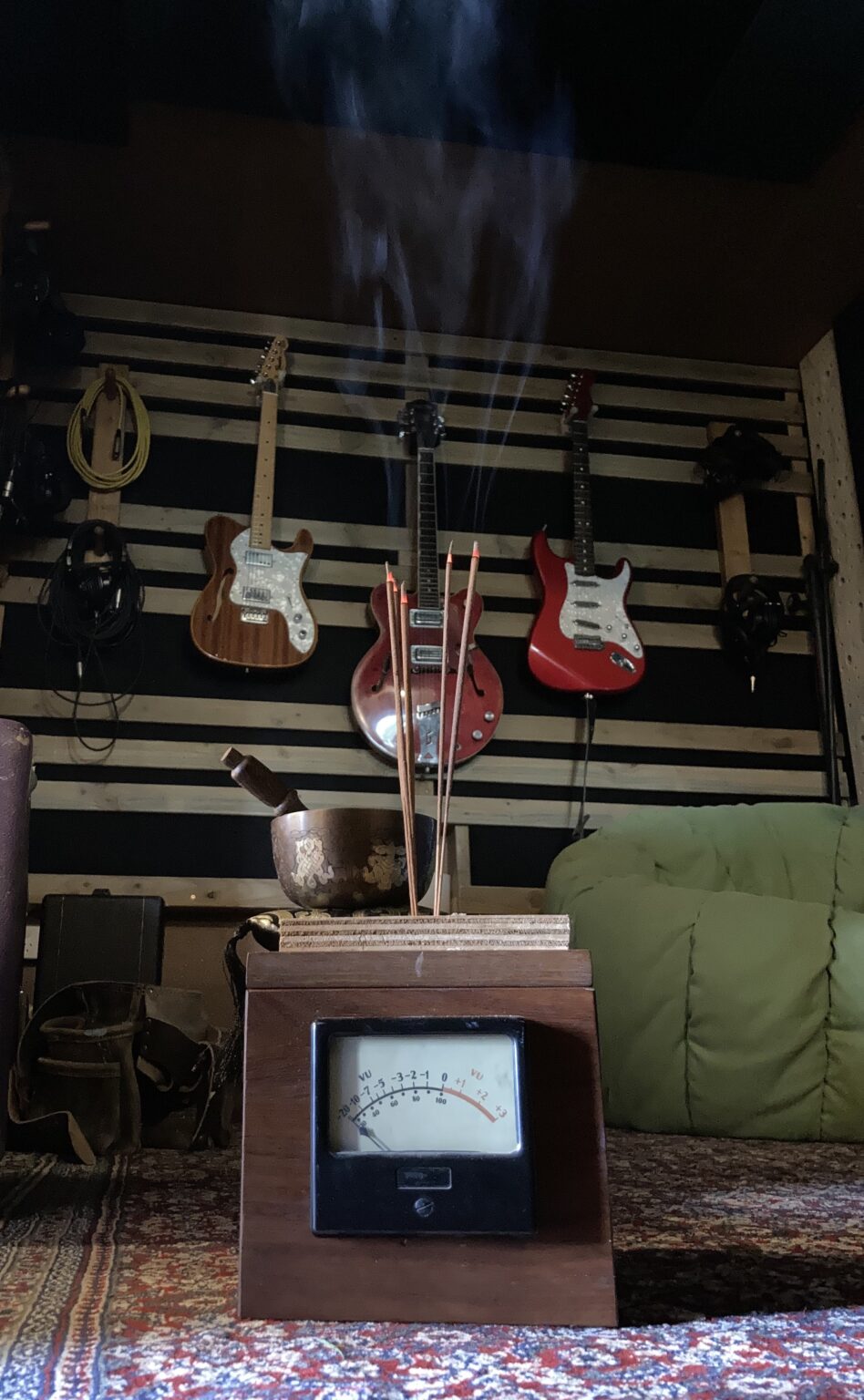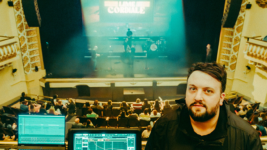News
29 Jun 2022
Listen Here: Lots Of Gear… No Ideas

Subscribe to CX E-News
When it comes to making recorded music, nothing stops you in your tracks faster than a lack of inspiration. Anyone can buy new gear thinking a purchase or two might act as some form of inspiration replacement therapy, and many of us do just that. But feeling uninspired is rarely cured long-term by owning yet more stuff. So, what do you do when you can’t buy your way out of the musical doldrums?
The first thing to understand if you’re in the game of making music is that everyone is different. We all contribute to the world of audio in our own specific ways, and none of us shares the exact same personal circumstances, at least not enough of them to infer that inspiration can be prescribed, as if by a doctor. On the contrary, inspiration comes to each of us at different times, in vastly different ways, hidden behind countless, often unrecognisable barriers.
Add to this unique set of odds our ability (or lack thereof) to harness inspiration when finally it strikes (if indeed that’s how it manifests for you), and you’ve got yourself a set of individual circumstances that are quirky to say the least, and in every respect difficult to get to know. For many, inspiration comes to us like a creeping mould rather than a lightning strike, while others wait interminably for it, never managing to recognise the signs. So it pays enormous dividends to learn what inspiration looks, feels or sounds like for you.
And yet despite our uniqueness, our own set of personal circumstances, we all have something in common: we all wrestle with our inspiration demons. Never think you’re alone in that for a moment. Outward appearances can be misleading, so while inspiration may appear to come easily to others around you (and certainly to your favourite artists), it’s almost certainly not the case. I am yet to hear of a single artist, living or dead, successful or otherwise, who didn’t have to engage in hand-to-hand combat with their lack of inspiration at some point. Indeed, many artists push against this inertia on a daily basis, especially the ones for whom art constitutes their livelihood. For them, it’s not so much about waiting for inspiration to strike as it is willing inspiration into the open. Many would go one step further by arguing that it’s precisely the act of overcoming their lack of inspiration that defines the art itself.
So let’s follow this train of logic shall we, and see where it leads? We may not arrive at any conclusive stations, but we can at least explore the track along the route. While we’re at it I’ll endeavour to stoke some inspirational fires, one quirky individual at a time.
Learn 2 B U
Now please don’t read this next line as if it floated out of the ‘New Age Book of Bollocks’ or was written in the air with special incense by a guru dressed in a sleeveless yellow sack.
So here we go: ‘No-one is better at being you than you.’
Yep, I agree, that may well be in the Book of Bollocks, only in this case, it’s true!
Being yourself, whether you’re a musician, a mix engineer, a producer or a candlestick maker, is the best way to create your most inspired, significant work. The biggest barrier to this assertion is simply convincing yourself of its truth. You’ve simply got to believe that your contribution is valuable: that your sonic ideas are worth pursuing, your lyrics worth singing and your productions worth hearing. It’s far more critical to your development as an artist than any piece of gear, technique or level of expertise.
If you can’t get behind your own work, either because you don’t think you’re any good, or because you’ve convinced yourself that someone out there is better at something than you, then you’ll end up doing one of two things: copying someone else’s work, which is the quick (yet flawed) way around the initial problem of being faced with a blank canvas, or you’ll eventually stop pursuing music, engineering, mixing or audio production altogether. Adding more gear to your collection when your mindset is locked into this negative thinking will simply add more intricate surfaces on which to accumulate dust.
The source of your art, what makes it unique to you as a human being, comes from within you, not from the latest plug-in or musical instrument. Your musical tastes, skills, preferences and decisions are what sustain you over the long haul, and most specifically define you as an artist. Not more stuff.
So back yourself, irrespective of where things appear to be going with your latest artistic foray. Don’t be overly critical of yourself or stop short of a breakthrough out of fear of the unknown, or of what someone else might think. There’s nothing more damaging to your art than wondering if this or that style of performance is cool right now in the eyes of someone else, or if the sound you’ve created for your latest mix fits with the latest trends this week. Just be present in the music (or the mix), and to hell with everyone and everything around you. No-one does your thing better than you – no-one! So take advantage of it! You’re in the box seat. Explore what that means, learn who you are, not who someone else appears to be. If you fall for the deadly trap of trying to copycat someone else, you’ll just end up sounding like a bad facsimile of their work – the musical equivalent of a bald guy in a toupee. Not good.
Free Expression
The other thing to remember about inspiration is that not everything you do in the studio has to have a direct link to results. Take the time to explore the tools around you: the instruments, the effects, and software in your arsenal to enjoy making sound for what it is. Make space and time to explore individual sounds for their own sake, be they nutty, harsh, beautiful, subtle, or innocuous.
What this form of ‘play without expectation’ inevitably does is encourage you to learn your craft, hone your skills, as you simultaneously explore the so-called ‘outer limits’ of your own technical capacity and musical palette. Try new things, obviously, but remember, it’s not the incredible new sound you discover that matters per se, but more importantly, who ascribes value to it. Developing an internal strength, confidence basically, gives you the green-light to determine something’s intrinsic artistic value, without having to consult the wider world, and more than anything, this is what you need to nurture. Don’t stop halfway down an exploratory path to wonder to yourself what someone else might think. Block that out for now. It’s a worthless distraction. Only concern yourself with what you reckon, because the only artistic preferences that really matter right now are your own. I mean that sincerely.
Back yourself to the hilt. That doesn’t mean you have to be a prat about it, become obnoxious in the studio or turn into a boastful ass, but it does involve being confident about your art by developing your sense of self-worth.
Look inward – don’t be quick to frame an opinion about whether something is good or bad based on what you suspect others might reckon. In fact, ideally, never do it.
Ground Out, Not Metered Out
But if, after all this positive thinking (and after all the incense sticks have been burnt) you’re still waiting for inspiration to strike, consider this: most music is ground out, not metered out by some magic fairy. If you’re determined to wait for that moment of inspiration, some call it an epiphany, before you make the effort to put pen to paper, pick up the guitar or try a new mix technique, you may find yourself waiting a very long time.
Producing results doesn’t always start with an inspirational spark offered unselfishly by a giant hand from above. On the contrary, it can come from the tiniest musical phrase, a happy accident, a technical misstep, or interaction with other people. This tends only to happen when you’re already at work or play – call it what you will. Only rarely can the origins of a piece of art be described as a having been born from an epiphany. What matters most is how open you are to these moments when they share a space with you, and how confident you are in deciding to pursue them.
One Last Thought
Once you establish yourself as an artist in your own mind, and you can confidently stride into the world strong in the belief that what you contribute to the sonic landscape has intrinsic value, then all bets are off; you’re up and running. Now you can go buy that inspirational instrument if you choose to, because you’re the one calling the shots. Just don’t let it gather dust.
Andy Stewart owns and operates The Mill studio in Victoria, a world-class production, mixing and mastering facility. He’s happy to respond to any pleas for pro audio help… contact him at: andy@themill.net.au or visit www.themillstudio.com.au
Subscribe
Published monthly since 1991, our famous AV industry magazine is free for download or pay for print. Subscribers also receive CX News, our free weekly email with the latest industry news and jobs.




